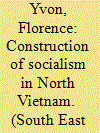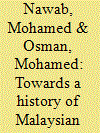| Srl | Item |
| 1 |
ID:
081542


|
|
|
|
|
| Publication |
2008.
|
| Summary/Abstract |
This paper examines the process of transformation of domestic trade in the early independent Democratic Republic of Vietnam, focusing on the grain sector. It argues that, after the severe food crisis of the spring of 1955, the regime called for structural changes and tried to establish a predominant socialist trade system, without however resorting to a state monopoly, but failed to implement the new institutions of socialist trade. The study further shows that this failure, together with other domestic policy issues, compelled the leaders of the DRV to tolerate de facto until about the second half of 1959 a modus vivendi between the state grain sector and the private economic actors. It also demonstrates that these institutional arrangements and innovative procurement policies were in fact quite successful: the food supplies, sold through the public distribution system and the market channels, were on the whole adequate; and the state procurement of paddy increased noticeably. However, because of heated debates in the Political Bureau, partly due to the failure of the state policy, this compromise came to an abrupt end in April 1959 and was followed by a rapid and drastic shift towards the construction of socialism. As a result, private trade had practically disappeared by the end of 1960.
|
|
|
|
|
|
|
|
|
|
|
|
|
|
|
|
| 2 |
ID:
081541


|
|
|
|
|
| Publication |
2008.
|
| Summary/Abstract |
Surprisingly, the outcome of the 1999 and 2004 elections in Indonesia and the resultant constellation of political parties are reminiscent of the first Indonesian parliamentary democracy of the 1950s. The dynamics of party politics is still marked by aliran ('streams'): that is, some of the biggest political parties are still identified with specific milieux. But politik aliran lost a lot of its significance and re-emerged in a quite different form after the fall of Suharto in 1998. It is argued that parties are still socially rooted, so a modified aliran approach still has its analytical value. But one can witness a weakening of aliran (dealiranisasi) or dealignment of political parties. This dealignment is indicated by the rise of presidential or presidentialized parties, growing intra-party authoritarianism, the prevalence of 'money politics', the lack of meaningful political platforms, weak loyalties towards parties, cartelization and the upsurge of new local elites. The identification with certain parties has remained, but the ideological cement as well as the organizational base has been eroded. The reasons for this lie in reforms of formal institutions and social factors, ie shifts in the relationship between capital and the political class, altered educational patterns and the rising importance of mass medi
|
|
|
|
|
|
|
|
|
|
|
|
|
|
|
|
| 3 |
ID:
081543


|
|
|
|
|
| Publication |
2008.
|
| Summary/Abstract |
This article examines the reactions of conservative Islamist groups to the publication of Playboy Indonesia and argues that their views deserve more recognition than they have received. In November 2006, the Public Prosecutor sued the Chief Editor of Playboy Indonesia for offending public morality. The prosecution of the magazine signified concerns about the global spread of commercial media products and the circulation of sexual imagery derived from other places, histories and norms. It was also about frustrated political ambitions and the interest some conservative Islamist groups had in reinstating the Jakarta Charter and establishing the rule of Sharia law
|
|
|
|
|
|
|
|
|
|
|
|
|
|
|
|
| 4 |
ID:
081544


|
|
|
|
|
| Publication |
2008.
|
| Summary/Abstract |
This paper traces the religio-political role of ulama in Malaysia. Its key argument is that historically the ulama in Malaysia have maintained a symbiotic relationship with various political authorities. From early Islamic history to the Japanese occupation, ulama have usually worked with any power willing to secure their authority and influence. The paper also shows that even when the ulama oppose the government - exemplified by the opposition of Parti Islam Se-Malaysia ulama to the UMNO-led Malaysian government - this opposition tends to stem from differences in politics rather than religious ideologies
|
|
|
|
|
|
|
|
|
|
|
|
|
|
|
|